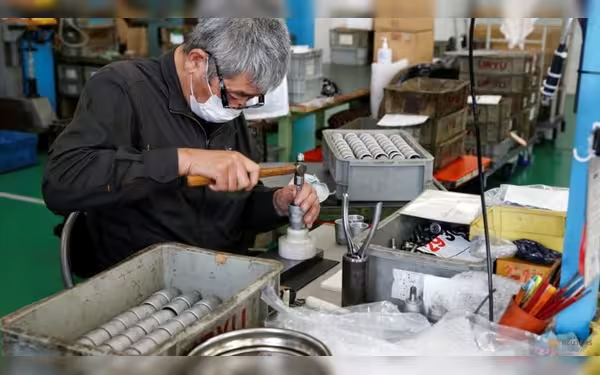Thursday, July 4, 2024 06:01 PM
Bank of Japan faces challenges amid economic uncertainties
- Rising costs impact service-sector business sentiment despite factory confidence
- Speculations of potential interest rate hike fueled by firms' intentions
- Mixed picture in tankan survey reveals challenges and opportunities for Japan's economy
 Image Credits: channelnewsasia
Image Credits: channelnewsasiaJapan's economic landscape faces uncertainties as rising costs impact business sentiment, fueling speculations of interest rate hikes. Challenges include historical GDP revisions and weak consumption trends, while opportunities lie in increased capital expenditure and inflation expectations.
Japan's economic landscape has been under scrutiny following the recent downgrade of its first-quarter gross domestic product (GDP). Concerns have arisen over rising costs impacting the service-sector business sentiment in June, despite a positive uptick in factory confidence. The 'tankan' quarterly survey has shed light on firms' intentions to increase capital expenditure and their expectations of inflation hovering around the Bank of Japan's target of 2 per cent in the foreseeable future. This has fueled speculations of a potential interest rate hike on the horizon.
The latest data poses a challenge for the Bank of Japan (BOJ) in determining the optimal timing for raising interest rates. While there has been an improvement in overall business sentiment, particularly among manufacturers, signs of weakness in consumption persist. The unexpected revision of Japan's historical GDP figures, indicating a more significant economic contraction in the first quarter, may prompt the BOJ to revise its growth forecasts downward. Nevertheless, the slight uptick in corporate inflation expectations has sustained market hopes for a rate hike.
Notably, the tankan survey has revealed a mixed picture, with service-sector firms displaying less optimism in June, possibly due to labor market constraints and subdued consumer spending. Despite a decline in sentiment among big non-manufacturers, major manufacturers have shown improved morale, driven by increased auto production and successful cost adjustments. Both sectors are gearing up for higher capital expenditure, while reports of elevated output prices signal underlying inflationary pressures.
Looking ahead, long-term corporate inflation projections have inched up, with companies envisioning inflation reaching 2.3 per cent in three years and 2.2 per cent in five years. The positive market response to the tankan results, with expectations of impending rate hikes, reflects growing confidence in Japan's economic trajectory. The BOJ's decision to terminate negative interest rates earlier this year was anchored on progress towards the 2 per cent inflation goal, setting the stage for potential future rate increases.
However, the BOJ faces hurdles in light of recent GDP revisions, lackluster consumption trends, and historical economic contractions. Analysts anticipate a substantial downgrade in this fiscal year's growth forecast, casting doubts on the feasibility of simultaneous reductions in bond purchases and interest rate hikes in the upcoming policy meeting.
Japan's economic landscape remains dynamic, with a delicate balance between positive indicators like increased capital expenditure plans and inflation expectations, and challenges such as weak consumption and historical GDP contractions. The upcoming policy decisions by the Bank of Japan will be crucial in navigating these complexities and steering the economy towards sustainable growth.













